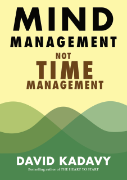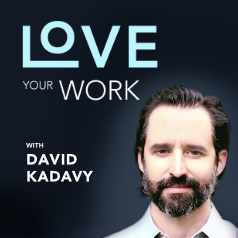Subscribe to blog updates via email »
Creative Success in Extremistan (Not Mediocristan) – Love Your Work, Episode 253
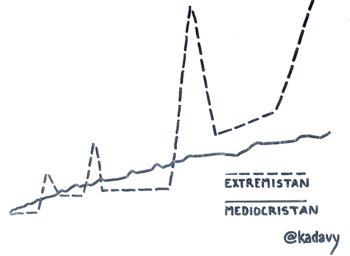 If you want to succeed in anything creative – whether that’s writing, art, or entrepreneurship – you’re navigating unfamiliar territory. Everyone else is living in Mediocristan, but you’re living in Extremistan. You need a different approach for deciding how you define success.
If you want to succeed in anything creative – whether that’s writing, art, or entrepreneurship – you’re navigating unfamiliar territory. Everyone else is living in Mediocristan, but you’re living in Extremistan. You need a different approach for deciding how you define success.
Listen to Extremistan vs. Mediocristan
- Listen in iTunes >>
- Download as an MP3 by right-clicking here and choosing “save as.”
- RSS feed for Love Your Work
“Extremistan” is a term introduced by Nassim Nicholas Taleb in his book, The Black Swan, which I summarized on episode 244. We tend to think we’re living in the opposite of Extremistan: Mediocristan. When we as creatives measure success and make our decisions as if we are in Mediocristan, we ruin any chance we have of succeeding in the world we’re actually in: Extremistan.

WANT TO WRITE A BOOK?
Download your FREE copy of How to Write a Book »
(for a limited time)
Extremistan defined
Extremistan is an imaginary place where events are random and unpredictable, and the impact of those events are extreme. It’s a world full of “Black Swans.”
Extremistan vs. Mediocristan
Mediocristan is a place that’s the opposite of Extremistan.
- Extremistan is unstable. Mediocristan is stable.
- Extremistan is the world of the unpredictable and unexpected. Mediocristan is the world of the predictable and expected.
- Extremistan is full of singular events (“Black Swans”). In Mediocristan, the same things happen over and over.
- Extremistan is full of variables that scale infinitely. In Mediocristan, all variables fall within a range.
We’re used to Mediocristan
Our modern world is built to be Mediocristan. We think we can predict what will happen. Some of this may be that our mental hard-wiring makes it difficult for us to think in terms of the unpredictable and unstable. Some of it is definitely because we’ve spread, across the collective, risks that face the individual.
An hourly-wage job is in Mediocristan
Imagine you have an hourly-wage job serving coffee at Starbucks. You’re working in Mediocristan.

There are plenty of unpredictable things Starbucks has to deal with serving millions of customers across tens of thousands of locations. Employees will call in sick or stop showing up. There can be a coffee bean shortage, causing prices to suddenly spike. Someone might slip and fall in the bathroom and sue for millions of dollars.
All these things affect Starbucks’ profits. One month, they may make a big profit. The next month, they may lose money and need to take out a loan to stay in business.
But all the while, you know exactly how much you’re getting paid each hour you work.
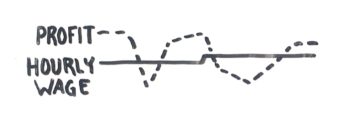
Starbucks can handle these shocks and pay you a steady wage because they spread risk across the entire organization. You don’t even notice if a water main breaks, flooding another location, or if the Director of Operations gets in a car wreck and ends up in the hospital for seven weeks.
Your hourly-wage job at Starbucks is mind-numbing, it’s boring, you’re living on rice and beans from Aldi. But, it’s impressively predictable. It beats the heck out of foraging in the jungle and hoping you don’t get pounced on by a puma.
Creative work happens in Extremistan
A Mediocristan job is a pretty sweet deal if the wage is livable. Though, stable, well-paying Mediocristan jobs are more and more scarce. That’s not the thing I want to talk about. What I want to talk about is how important it is to understand that when you’re doing creative work, you’re not in Mediocristan, rather you’re in Extremistan.
An author works in Extremistan
Imagine if when you get off your shift at Starbucks, you sit down and write each day. After you build a writing habit and keep it for several years, you finish your first novel.
You upload your novel to Amazon, and: nothing. You get a few sales a month. Then one day, you log into your Amazon dashboard, and see a huge spike. You’ve sold 3,000 books, and it’s not even 10 a.m. Turns out an influencer shared your book on TikTok.
3,000 books is just the beginning. Your book becomes a massive best-seller. You sell millions. A big publisher picks it up and distributes it around the world. You’re getting six-figure checks for foreign rights deals, then you get a seven-figure check for the movie rights. You quit the Starbucks job. Your life is forever changed.
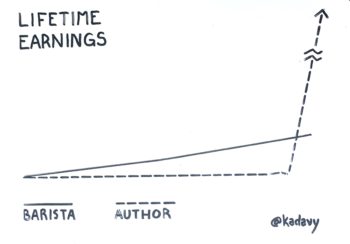
Extremistan is a world of extremes
Your job at Starbucks is in Mediocristan. Your work as an author is in Extremistan. Remember, Extremistan is unstable, unpredictable, with singular events and variables that scale infinitely.
- You wrote every day after work, with no financial returns – suddenly you had more money than you knew what to do with. That’s unstable.
- It looked as if your book was a failure, until it wasn’t. That’s unpredictable.
- By some fluke, the influencer shared your book. That was a singular event (a “Black Swan”).
- There’s virtually no limit to the number of books you could sell. Your book sales are a variable that could scale infinitely.
As the name would imply, Extremistan is a world of extremes.
In Mediocristan, variables fall within a range
In Mediocristan, variables fall within a range. The height of humans is a good example. The height of humans is distributed on a bell curve. There are a lot of people who are about average height. There are far fewer people on the tails of the bell curve whether extremely tall, or extremely short. There are no adults nine inches tall, nor ninety feet tall. No one has even been nine feet tall.
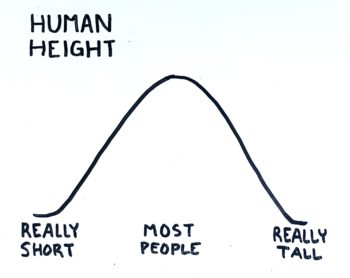
In Extremistan, variables scale infinitely
In Extremistan, variables scale infinitely. The “average” net worth of a U.S. family is about $700,000. But while there are a lot of people who are average height, there aren’t so many with average wealth. To be richer than half of all Americans, you need “only” $100,000.
Why are so many Americans below “average” wealth? Because if Bill Gates walks into a bar, on average, everyone there is a billionaire. The people on the high edge of wealth distribution are so wealthy, they skew the average. Jeff Bezos has 1 million times the wealth of the average American – over $100 billion.
Jeff Bezos has a net worth of $200 billion.
— ? David Kadavy (@kadavy) March 24, 2021
Here's what that looks like relative to wealth distribution of the U.S. population. pic.twitter.com/R6ZxKLqqoU
Human height has a predictable and limited range – it’s in Mediocristan. Wealth has an unpredictable and unlimited range – it’s in Extremistan.
Be careful what you learn in Extremistan
Because Extremistan is so unpredictable, with unlimited variables, you have to be careful not to draw conclusions too soon from what you see in Extremistan.
A quote from Taleb:
In Extremistan, one unit can easily affect the total in a disproportionate way. In this world, you should always be suspicious of the knowledge you derive from data.
In other words, the individual can skew the collective – Bill Gates walks into a bar and on average everyone there is a billionaire. So be careful what conclusions you draw from the data, when you’re working in Extremistan.
It wouldn’t matter how long you worked at that hourly-wage job at Starbucks – you wouldn’t get rich. If the wage were livable, and you enjoyed the work, that could be fine.
Don’t measure Extremistan success on Mediocristan terms
But you’re in trouble if, while writing your novel, you measure success on the same terms as you measure success at your hourly-wage job at Starbucks. You’d be measuring Extremistan work on Mediocristan terms. You could do something well at work, and get a dollar-an-hour raise. You’re seeing progress. You could write an incredible chapter in your book, and not see no immediate benefit.
Yet the impact of that dollar-an-hour raise, stretched out over your entire Starbucks career, may be tiny when compared to the lifetime benefit of the incredible, climactic, chapter in your novel.
If you only looked at the data you immediately received, you’d quickly conclude there was no point in working on your novel. You might as well stick to serving coffee.
Another quote from Taleb:
What you can know from data in Mediocristan augments very rapidly with the supply of information. But knowledge in Extremistan grows slowly and erratically…
In other words, in Mediocristan, the more data you collect, the more you know. In Extremistan, the more data you collect, the more you think you know – if you’re not careful. In reality, new data in Extremistan tells you very little.
Success in Extremistan is explosive
Like wealth, success in creative work scales infinitely. Art De Vany studied the box-office performance of 350 movies that came out during the course of nine months. The top four of those 350 movies made 20% of the total revenue. The bottom four: 0.0036%. The top movie made almost $50 million. The bottom movie, about $5,000.
Success in Extremistan is random
Nobody spends millions making a movie to only make $5,000. If the movie industry knew how to make $50 million instead, they would only make the movies that made $50 million.
William Goldman wrote a lot of screenplays, including the cult classic, The Princess Bride. He won two Academy Awards for other screenplays. Still, he said,
Nobody knows anything…. Not one person in the entire motion picture field knows for a certainty what’s going to work. Every time out it’s a guess and, if you’re lucky, an educated one. —William Goldman
This applies to movies, books, scientific discoveries, and entrepreneurship. You can learn and apply skill, but ultimately success in Extremistan is random.
Success in Extremistan is delayed
Success in Extremistan can also be delayed. Vincent van Gogh, after only two years of painting, wrote his brother Theo saying that maybe he had made a mistake investing so much in painting. It wasn’t until after ten years of painting that Van Gogh’s work was recognized – just before his early death at 37.
It took Leonardo three years to paint The Last Supper. It took Marie Curie four years to isolate radium. It took James Cameron fifteen years to produce Avatar.
Don’t use Mediocristan terms to measure Extremistan success
When you’re measuring success in Mediocristan, you expect to see the graph go “up and to the right.” But success in Extremistan looks more like a poorly-shaved porcupine.
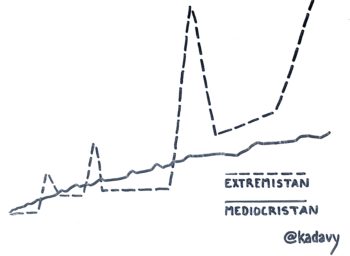
The more you measure success in Extremistan on Mediocristan terms, the less you’ll invest in doing the kinds of things that will bring you success in Extremistan.
If you focus all your energy on A/B testing, you’ll only ever see incremental gains. Misleading A/B test data aside, you’ll never take chances that lead to explosive growth.
If you dismiss advice or don’t try something based upon a flawed interpretation of survivorship bias – as I talked about on episode 251, you won’t have the perseverance to stick around long enough for randomness to give you a boost (remember, The Queen’s Gambit took 37 years to become a bestseller).
Creative work is about riding randomness in Extremistan
If you want to make it in creative work, you need to recognize that you’re riding randomness. That’s a tough thing to get comfortable with – we like to have sure bets. A good strategy is “The Barbell Strategy,” which I talked about in The Black Swan book summary on episode 244: Go ahead and take the sure bets, but leave some room for the wildcards. Work the Starbucks job, but spend your evenings writing the boldest novel you can.
We think of our world as predictable. We want to see steady growth. But the predicable and steady is from Mediocristan. Finding your way to success in creative work is a journey through Extremistan.
The Mind Management, Not Time Management audiobook is here!
Listen to the Mind Management, Not Time Management audiobook free with an Audible trial, or search for the audiobook on your favorite platform.
Thank you for having me on your podcasts!
Thank you for having me on your podcast! Thank you to Trey Kauffman at The Mosaic Life and the team at Domestika for having me as a Comic Sans expert on their Curious Minds podcast.
As always, you can see a full list of podcasts I’ve been here.
Join the Patreon for (new) bonus content!
I've been adding lots of new content to Patreon. Join the Patreon »
Subscribe to Love Your Work
Listen to the Podcast
- Listen in iTunes >>
- Download as an MP3 by right-clicking here and choosing “save as.”
- RSS feed for Love Your Work
Theme music: Dorena “At Sea”, from the album About Everything And More. By Arrangement with Deep Elm Records. Listen on Spotify »

